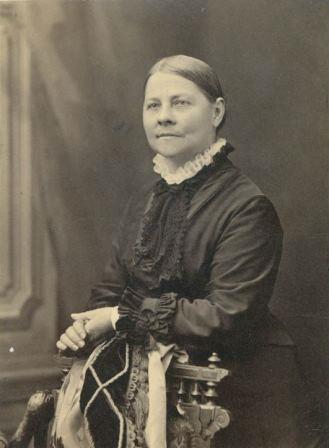By Susan Martin, Collection Services
As I looked through the MHS collections for a Massachusetts woman to profile for Women’s History Month, I found myself faced with an embarrassment of riches. Our library holds the papers of female writers, doctors, teachers, artists, war volunteers, and mill workers, not to mention slaves and First Ladies. I decided to go back to a letter acquired by the MHS a few years ago. The letter was written by Lucy Stone on election day 1890, and I remembered her terrifically snarky opening sentence: “This is the day when our political superiors are electing rulers for Women!!”


Lucy Stone (1818-1893) was a suffragist and abolitionist from West Brookfield, Mass., famous for her oratory at a time when public speaking by women was considered scandalous and unfeminine. According to one account, before an appearance by Stone, a certain minister warned his congregation that “a hen will undertake to crow like a cock.” Opponents of her speeches shouted her down, threw hymn books at her, and even once dowsed her with water from a hose. As Sally G. McMillen wrote in her biography Lucy Stone: An Unapologetic Life (2015):
To say that most mid-nineteenth-century Americans deemed this occupation wholly inappropriate for women was a truism. Women were not supposed to have a public persona; they were supposed to marry and spend their lives in the quiet of home. And the two causes that Lucy espoused on which she intended to speak were radical ones. [p. 63]
Stone is also known for her refusal to take her husband’s name when she married—later advocates of this practice were often called “Lucy Stoners.”
This letter was written on the stationery of the Woman’s Journal, a paper founded in 1870 by Stone, her husband, and other like-minded reformers. The recipient, Mrs. Steele, had submitted an article, and Stone wrote back to explain that she couldn’t pay for contributions; the paper “had hard uphill work all the time and as hard now as ever was.” She offered Steele a one-year subscription instead and finished with: “I am sorry not to have said this sooner. But too many things to do in the cause.”
I had hoped to identify Mrs. Steele, but unfortunately came up empty. I did find three possible candidates: Lucy Page Steele of Washington, D.C., who wrote for the Young Woman’s Journal; Anna (Truax) Steele, wife of Colorado’s Chief Justice Robert W. Steele; or Carrie Steele, the “Mother of Orphans,” a former slave and founder of an African-American orphanage in Atlanta, Ga.
Lucy Stone did not live to see the battle for suffrage won for all American women, which wouldn’t happen for 27 more years with the passage of the Nineteenth Amendment. But less than three weeks after her death, on 7 November 1893, Colorado became the first state to enact women’s suffrage through popular vote.
Lucy Stone, Abigail Adams, and Phillis Wheatley are honored in the Boston Women’s Memorial on the Commonwealth Avenue Mall.

